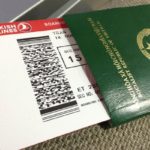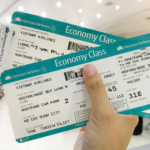Every trip brings us memorable experiences, with the opportunity to explore the culture and local cuisine wherever we go. This is also a mental tonic that helps relax the mind, reduce stress and fatigue. However, in the internet age, every traveler needs to be aware of things not to post on social media while traveling to avoid becoming a victim of cybercrime.
Things not to post on social media while traveling
Even though you are thrilled with the trip and the amazing experiences, you should also be aware of what not to share on social media.
Passport, visa
Passport, visa contain important personal information that if disclosed, can lead to personal information theft and even legal trouble.
Criminals can steal information in your passport and use it for theft, extortion, or even worse, to create fake documents for illegal purposes. With the personal information in your passport and visa, these criminals can easily access your email, bank accounts, etc.
You should also avoid revealing information such as passport number, visa management number, visa expiration date, and issue date. If you need to take pictures of your visa and passport for travel purposes, make sure to delete them after use to prevent the risk of losing your phone or getting hacked.
Airline ticket
The trend of showing off airline tickets is quite popular, as many people like to post them as a way to “brag” about their upcoming trips. However, even if you hide your name, date, and flight details, the barcode on the ticket can still reveal personal information. Just by posting the barcode on a dedicated website, criminals can collect your flight information and use it for malicious purposes.
Therefore, airline tickets are one of the things you should not post on social media while traveling.
Check-in locations
Checking in at the airport, restaurants, and tourist attractions has become an indispensable part of most travelers’ journeys. This seemingly harmless habit can unintentionally put you in danger, as criminals can learn about your personal information and travel destinations, making it convenient for them to carry out malicious intentions. Female solo travelers should be especially cautious about sharing detailed check-in locations.
To protect your safety, many people limit the visibility of their posts, only sharing moments and travel destinations with close friends and family. However, there is still a high possibility of information leakage. Therefore, it is best not to check-in with specific addresses while traveling or to post after leaving the travel destination safely.
Detailed itineraries
Travel itineraries and resort hotel information are also on the list of things not to post on social media while traveling because they can be quite risky. You can be followed or robbed. Moreover, if you post a detailed itinerary, enemies can track and sneak into your resort to steal or engage in harmful activities.
Some important notes for a safe trip
Set up privacy settings on social media platforms: Only share travel destinations and stories with close friends and acquaintances to increase interaction on social media platforms.
Be cautious when attaching location or check-in information, as many social media applications have tracking and positioning features that can easily reveal your travel information.
It is advisable to post after completing the trip to ensure maximum safety.
According to VTC
 There are things you should not post on social media while traveling. (Illustration: Istock)
There are things you should not post on social media while traveling. (Illustration: Istock)
Easily Present Your Passport with VNeID App
The Ministry of Public Security has rolled out the game-changing VNeID app, making it easier for citizens to access a range of services with just one digital passport instead of relying on traditional paper documents.




































